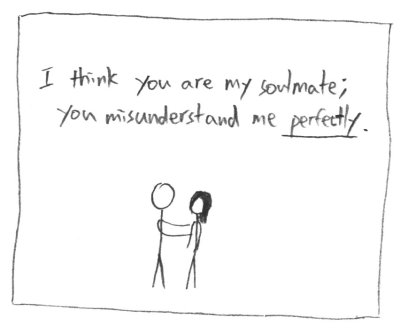Living in Chicago, you often need to orient yourself with cardinal directions. The red line goes north and south; the blue line takes two diagonal routes to the west. At least the first couple years, you might find yourself asking strangers, “Which way is the lake?”
“If you’re facing the DePaul Center, it’s right down Jackson.”
“Okay that’s east then, thanks.”
Chicagoans use compass directions to get around the city, but that’s nothing compared to those Australian aboriginals who speak Guugu Yimithirr. Yesterday in Conversation and Culture we discussed a New York Times article that elaborated on how our native language affects the way we see the world and it introduced us to this language. Guugu Yimithirr only uses cardinal directions. So if you ask someone for water, you would say, “The glasses are in the west cabinet.” We pride ourselves on being able to navigate the city, but imagine dropping a Chicago native in Far North Queensland, Australia. They’d be mentally exhausted trying to keep up in a Guugu Yimithirr conversation, because it requires them to reconfigure their own perspective.
This is part of what we talked and laughed about at Conversation and Culture: what do you have to figure out about American thought in order to understand American English? One student Amin (a pseudonym) made an eye opening point about English and its words’ multiple meanings. For him it is frustrating to have to shuffle through 4 or 5 possible meanings of a word and figure out what someone is saying. As a native speaker I take this for granted, because I’m comfortable intuiting what someone is saying through context. But it’s true: the word “set” in English has 67 definitions. That’s an epic number.
By contrast, he and another student affirmed that in Arabic words typically have one concrete meaning. Does this mean there is less potential for misunderstanding when speaking Arabic? Are Arabic speakers more direct than English speakers? Have English speakers adapted to finding meaning in confusing situations? Do they rely more on facial expression to find meaning? Is that smelly man on the El actually more kind and interesting than his rambling appears? Though they are speculative and perhaps unanswerable, these are the kinds of questions that excite us when considering the effect of language on our perspective. To a native speaker of English, someone who manipulates multiple meanings like Shakespeare may appear playful and witty, whereas a native speaker of Arabic may think that he should be more straightforward.
Amin’s perspective made me imagine what it would be like to structure my thoughts in Arabic and the potential excited me. I would love to feel like when I say something, I know exactly (or almost exactly) what it means. On the other hand, I hope that he can become excited and even entertained by the crisscrossing nature of English. If we both make the leap, then we have expanded our ability to understand and enjoy perspectives different from our own. Realizing and celebrating the differences between languages and the cultures that birth them helps expand us to a global community, which is convenient since we all live on the same planet. So what I’m saying is, come to Conversation and Culture on Thursdays in the Loop from 1 to 2pm, and you’ll have the opportunity to see the world through someone else’s words.

